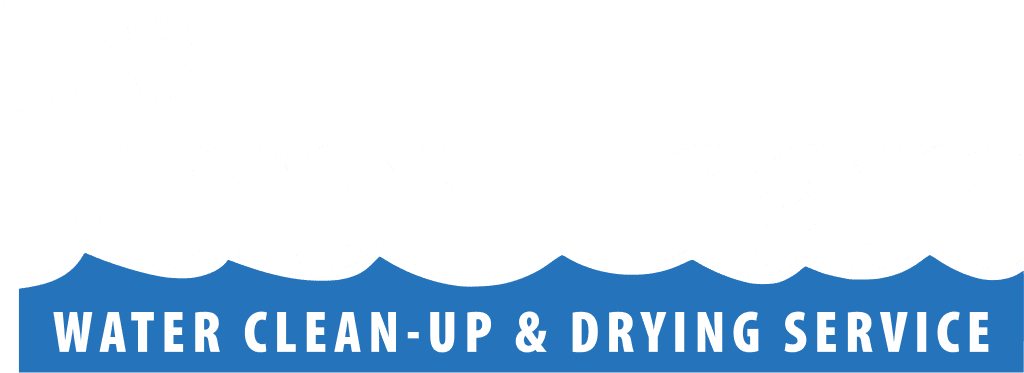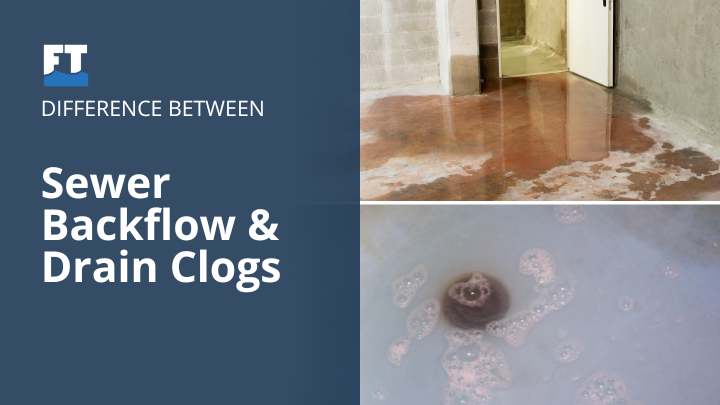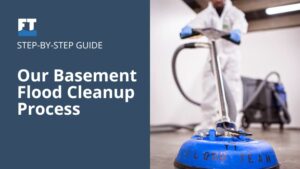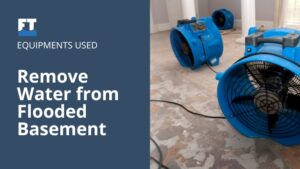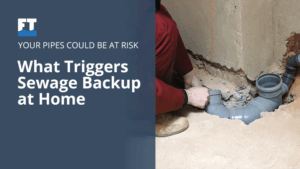There’s nothing quite as frustrating or panic-inducing as water coming up when it’s supposed to be going down. Whether it’s a slow-draining sink or something much messier bubbling up from the toilet, knowing what you’re dealing with makes a big difference. Not all plumbing problems are the same, and treating the wrong one the wrong way can make things worse.
So what’s really going on? Is it a simple drain clog or something more serious, like sewer backflow? While both can cause backups, they’re not the same, and the fix for each is very different. Let’s take a closer look at the difference between sewer backflow and drain clogs, so you know how to handle each situation the right way.
What Is a Drain Clog?
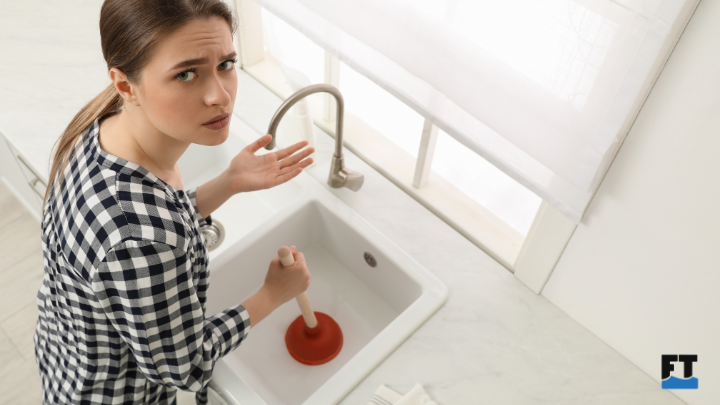
A drain clog is probably what most people think of when a sink or shower won’t drain properly. It’s usually caused by something blocking the pipe right at or near the fixture.
Common causes of drain clogs include:
- Hair buildup in the shower
- Food or grease in the kitchen sink
- Soap scum or mineral buildup
- Flushed wipes or paper towels in toilets
You’ll notice things like:
- Water draining slowly
- Gurgling sounds after you run water.
- A foul smell is coming from one specific drain.
The good news? Clogs are usually an easy fix. Plungers, drain snakes, or even a mix of baking soda and vinegar can often clear them. If that doesn’t work, drain cleaning services can usually get things flowing again pretty fast.
What Is Sewer Backflow?
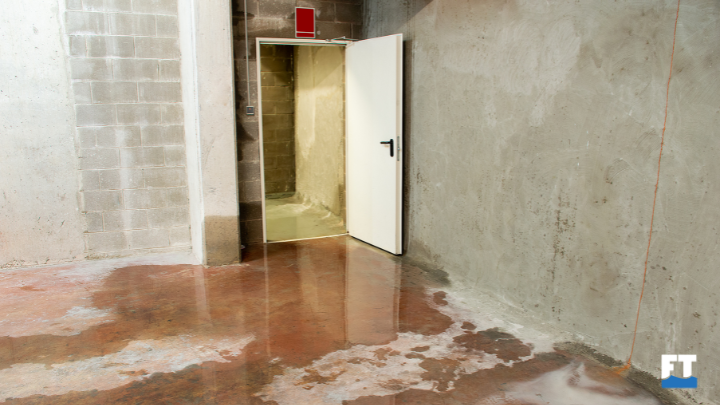
Sewer backflow is a bigger issue, and it’s something no one wants to deal with. Instead of water going out of your home like it should, it comes back in. This isn’t just annoying. It can be dangerous, especially if sewage is involved.
Common causes of sewer backflow:
- A blocked or broken main sewer line
- Tree roots growing into the sewer pipes
- Heavy rain or flooding overwhelms the system
- A backflow valve that failed (or no valve at all)
The warning signs are more serious:
- Water or sewage backing up from multiple drains
- A strong sewage smell from toilets, sinks, or floor drains
- Water pooling in the basement or lower-level drains
Unlike a regular clog, this affects your whole plumbing system. If you flush a toilet and water gurgles in the shower, or you run the washing machine and water spills into the tub, that’s likely a backflow issue. Knowing the steps after a sewage backup can help prevent further damage and health risks.
Key Differences Between Drain Clogs and Sewer Backflow
Here’s a simple way to look at the difference between sewer backflow and drain clogs:
| Feature | Drain Clog | Sewer Backflow |
| Affects | One drain or fixture | Multiple drains at once |
| Cause | Local blockage (hair, grease) | Mainline issue or outside source |
| Smell | Mild odor | Strong sewage smell |
| Water Type | Grey water | Often black water (sewage) |
| Risk | Low | High (can involve health hazards) |
If only one drain is acting up, it’s probably a clog. But if more than one thing is backing up—or if there’s water where it really shouldn’t be, it’s time to call for help.
What to Do If You’re Not Sure
If you’re seeing signs but not totally sure what’s going on, try this:
Flush the toilet and watch what happens in the nearby tub or shower. If water backs up there, it’s likely sewer-related.
Another test? Run water in one sink and see if the other drains gurgle. If yes, there’s a good chance the problem is deeper in the system.
Trying to snake a clogged drain when it’s actually backflow might not help, and could even make it worse. If you’re dealing with foul-smelling water, multiple slow drains, or backups in the basement, stop what you’re doing and call a professional.
Prevention Tips for Both Problems
Some plumbing problems can’t be avoided, but there are simple ways to reduce your chances of a clog or backup.
For drain clogs:
- Don’t pour grease down the kitchen sink
- Use mesh strainers to catch hair and debris
- Avoid flushing wipes, even “flushable” ones
- Don’t dump coffee grounds or food scraps in the drain
For sewer backflow:
- Get your main sewer line inspected every few years
- Install a backwater valve if your area floods
- Keep large trees away from sewer lines
- Make sure your sump pump is working, especially during rainy seasons
These small habits can go a long way in saving you from the hassle (and gross cleanup) of plumbing emergencies.
Drain Clogs or Sewer Backflow? We Handle Both.
Don’t guess when it comes to plumbing problems. At The Flood Team, our trusted drain cleaning services and professional sewage backup cleanup can solve it fast, before it gets worse.
Book a free evaluation now to get things flowing again.
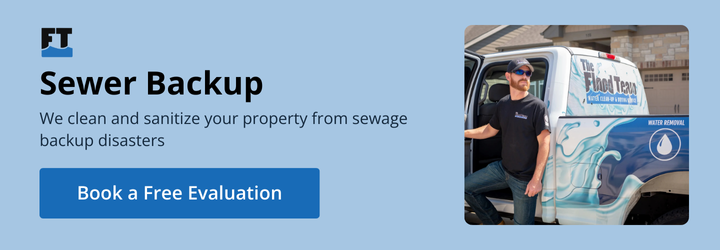
Final Thoughts
It’s easy to assume all drain problems are the same. But the difference between sewer backflow and drain clogs is huge, and knowing which one you’re dealing with can save you time, stress, and money. A clogged sink is annoying, but sewer backflow is a whole-house issue that requires prompt attention. If you’re not sure what’s happening, play it safe. Hire a plumber before the issue worsens.
FAQs
How do I distinguish between a clog and sewer backflow?
If just one drain is acting up, it’s likely a clog. However, if water’s coming back up from more than one spot—such as the shower and toilet—it may be backflow.
Can a regular clog turn into a sewer backup?
Not usually. A clog stays local to one pipe or fixture. Sewer backflow involves the whole system or the city’s main. They’re separate issues.
Is sewer backflow dangerous?
Yes. It often involves dirty or contaminated water, and it can damage your home. It’s not something to wait on—call a plumber right away.
Can I fix a sewer backup myself?
Probably not. It usually requires professional equipment and safety gear. Additionally, it’s challenging to pinpoint the exact issue without the right tools.
How can I stop this from happening again?
Don’t flush problem items like wipes or grease. Get regular inspections at The Flood Team, especially if your home is older.
